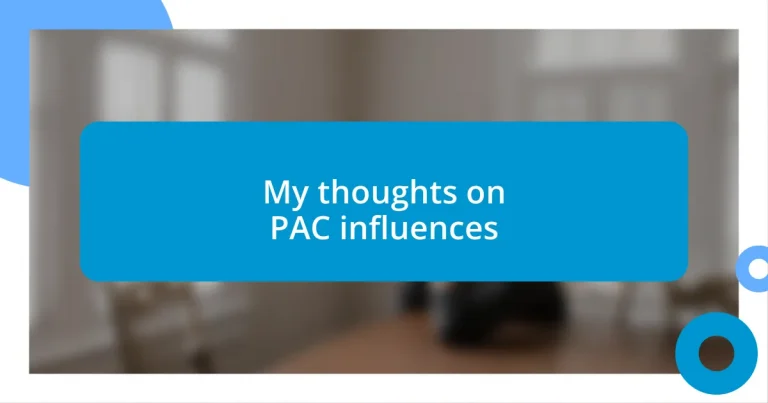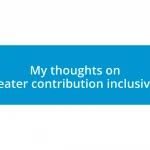Key takeaways:
- PACs are powerful entities that influence political landscapes through financial contributions and strategic support for candidates.
- Different types of PACs (Connected, Non-connected, Leadership) play distinct roles in elections and advocacy, impacting candidates and policy agendas.
- PAC funding can energize campaigns and amplify messages but also raises concerns about the potential for corruption and accountability issues for elected officials.
- The inequity created by significant PAC financing can distort democratic representation, calling for reforms to ensure fair electoral processes.
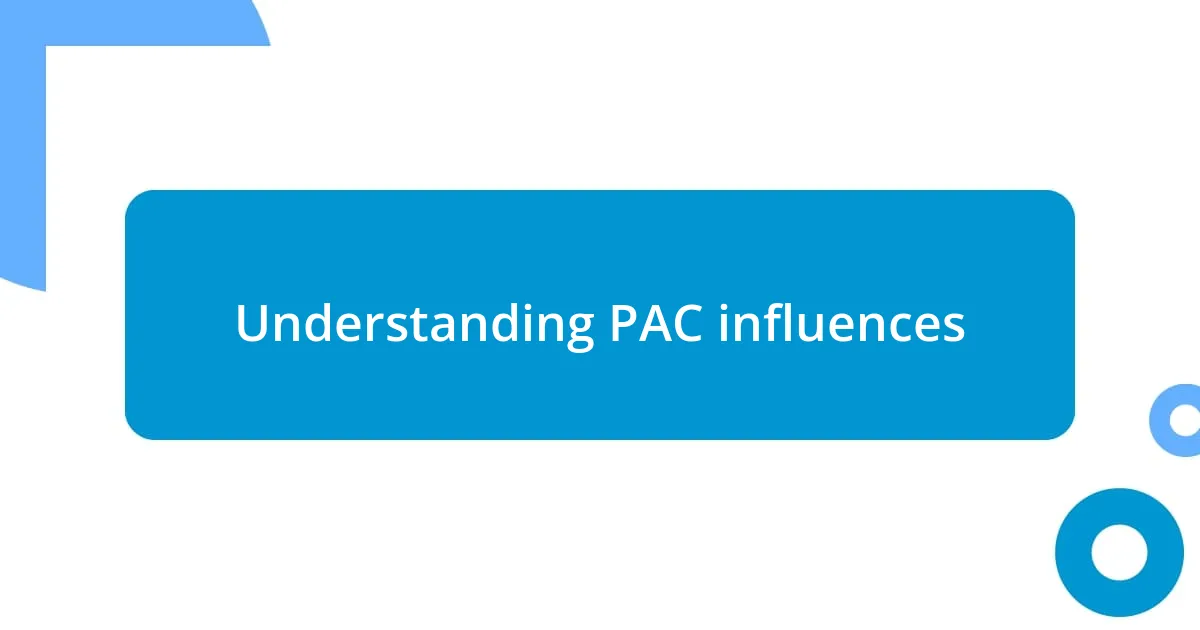
Understanding PAC influences
When I think about PAC influences, I can’t help but reflect on the sheer power they wield in shaping political landscapes. Political Action Committees (PACs) often serve as both a financial backbone and a strategic voice for particular interests, allowing them to push their agendas more effectively. It’s intriguing to see how a donation can sway a candidate’s priorities—doesn’t that highlight the complex relationship between money and democracy?
I’ve witnessed firsthand how PACs impact local elections. One time, I attended a town hall meeting where a candidate passionately spoke about environmental issues. But afterward, I learned that a PAC tied to fossil fuel interests had funneled significant support to their campaign. It left me wondering—can we really trust candidates who have these financial ties?
Understanding PAC influences means recognizing that they’re not just about dollars and cents; they represent a web of interests and motivations. I’ve often felt that voters need to delve deeper into who is backing whom. Don’t you think it’s essential to peel back those layers to see the bigger picture? It’s not just about the votes; it’s about who stands behind our elected officials and makes those critical decisions.
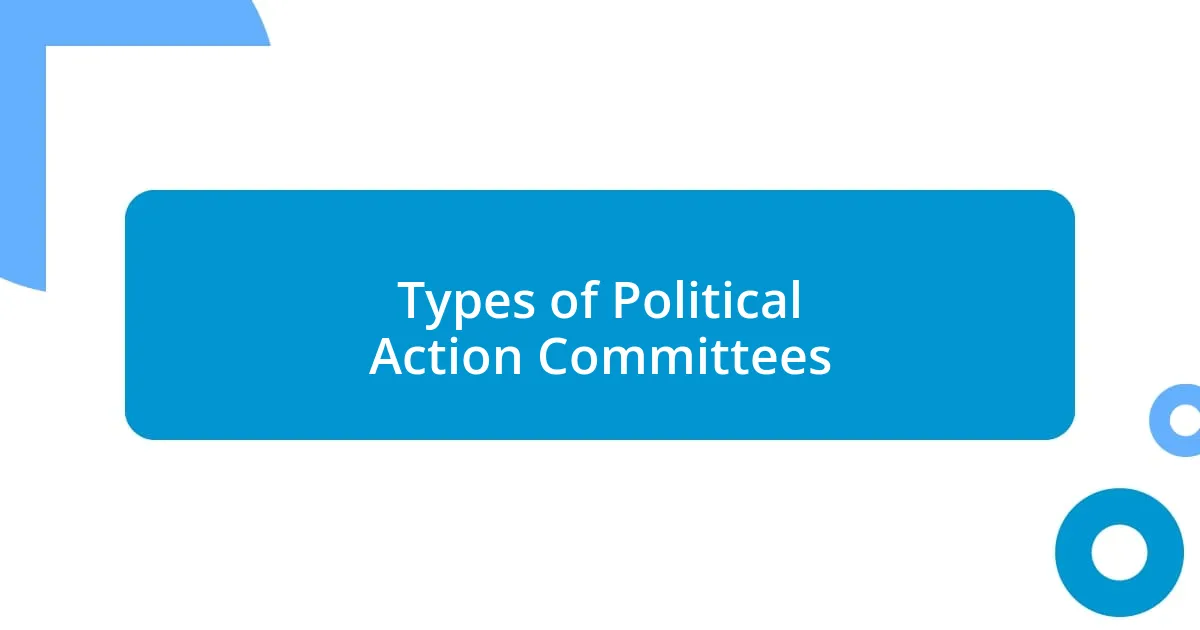
Types of Political Action Committees
Political Action Committees come in several forms, each with unique roles and influences. I’ve seen how different types of PACs engage in various aspects of the political process, from funding candidates to advocating for specific issues. Here’s a brief rundown of the main types:
- Connected PACs: These are established by corporations or labor unions, typically using their funds to support candidates that align with their interests. I recall a union organizing a fundraiser that vastly boosted the profile of a candidate advocating for workers’ rights.
- Non-connected PACs: These operate independently of any direct affiliation with organizations and can raise money from a broad base of contributors. At a community fundraiser, I met people who had banded together to form a non-connected PAC, highlighting how grassroots movements can influence the political stage.
- Leadership PACs: Run by politicians, these PACs help to support other candidates and often create a network of influence. I remember attending a political event where a well-known leader praised up-and-coming candidates, signaling their support and building alliances that could rock the political boat.
Each type of PAC can significantly impact elections and policies, shaping the narratives we see in politics today. Recognizing the distinctions helps us understand the broader implications of their activities and how they resonate within our communities.
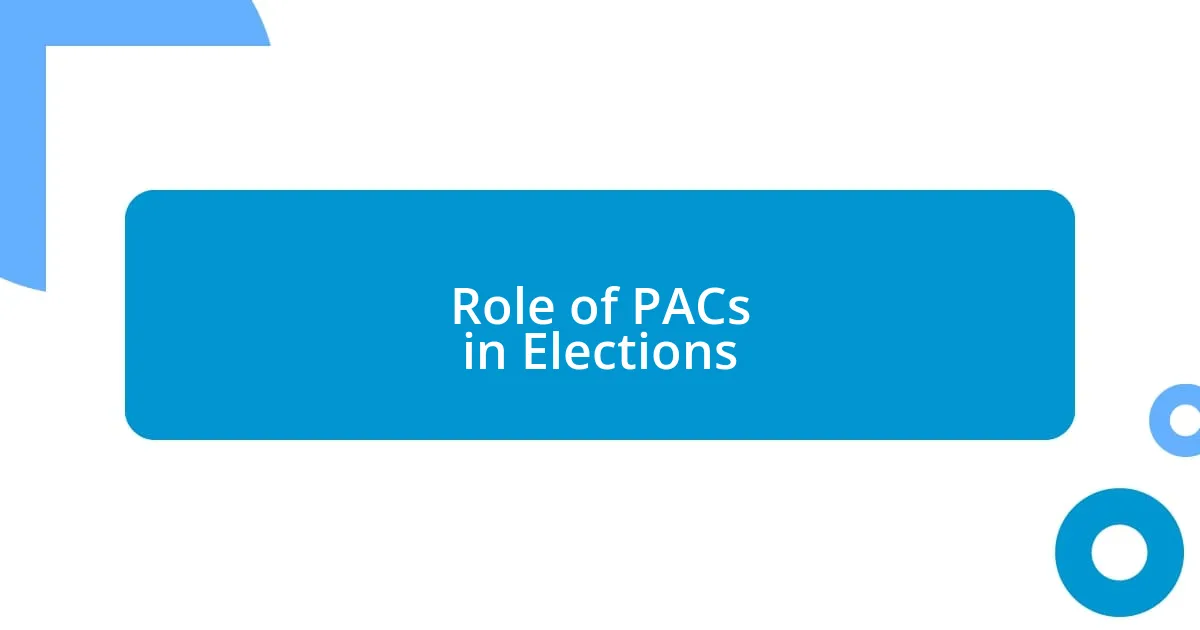
Role of PACs in Elections
The role of Political Action Committees (PACs) in elections can’t be overstated. They not only provide essential funding but also create networks that amplify candidates’ voices. I remember attending a campaign rally where a candidate emphasized the importance of grassroots donations while an enormous banner displayed their PAC support—it really struck me how interconnected these influences are in shaping electoral success.
PACs strategically target candidates, investing in those who align with their agendas. I once spoke to a political consultant who shared stories of how PACs conduct extensive research to identify key races worth the investment. This foresight can literally tip the scales during elections, often determining outcomes based on strategic spending rather than mere popularity. Doesn’t it make you consider how much is riding on these financial relationships?
Moreover, the influence of PACs stretches beyond just elections; they help define policy agendas that affect our daily lives. There’s a subtle but powerful dance between elected officials and PACs, fostering an environment where certain issues are prioritized over others. I was deeply moved at a community board meeting when residents passionately raised concerns about local developments heavily funded by a PAC, which led to a heated discussion about accountability. This is the kind of dynamic that showcases how PACs influence the broader political narrative, often in ways that resonate with our personal experiences and concerns.
| Aspect | Description |
|---|---|
| Funding | PACs provide crucial financial support to candidates, often swaying election results. |
| Research and Strategy | PACs analyze races to invest strategically, influencing electoral outcomes based on targeted spending. |
| Policy Influence | PACs help shape the political agenda, prioritizing issues that align with their interests. |
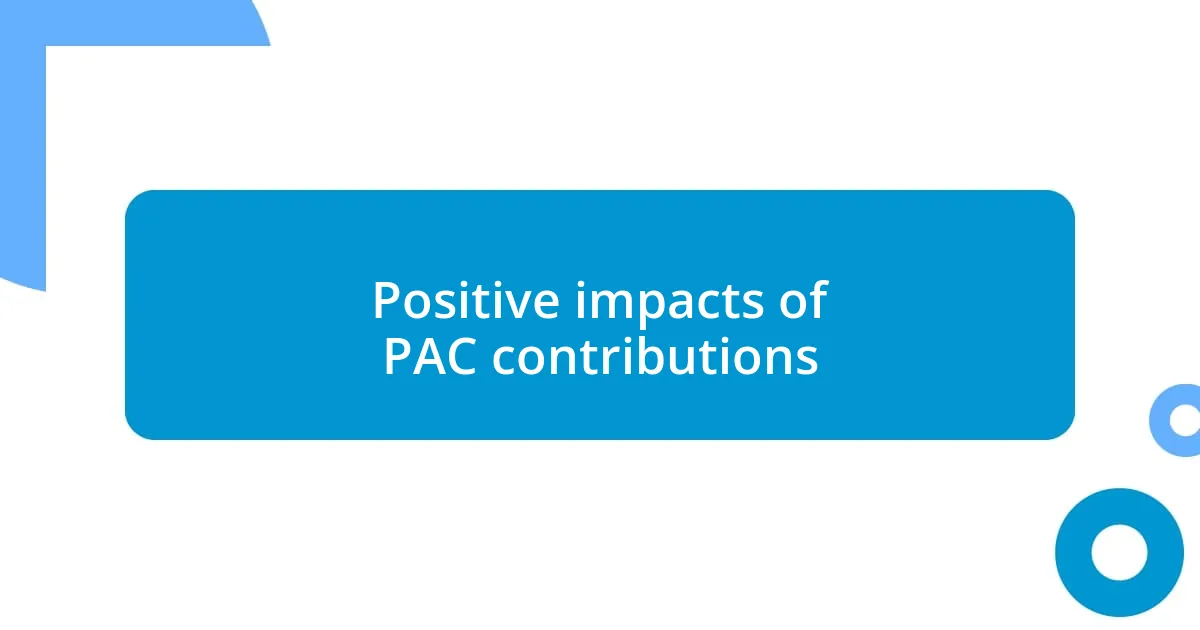
Positive impacts of PAC contributions
It’s fascinating how PAC contributions can bolster candidates’ campaigns significantly. For instance, during a local election, I attended a fundraiser where every dollar raised seemed to energize the supporters and amplify the candidate’s message. That moment made me realize how crucial this financial backing can be—not just for the candidate, but for the entire campaign dynamic.
What really stood out to me was a story I heard from a campaign manager who described how PAC support allowed them to extend outreach efforts. With funds in place, they could invest in targeted ads and community engagement initiatives that might otherwise have been impossible. I remember thinking, how empowering it must feel for candidates to harness such energy and resources, creating a ripple effect in their communities.
Moreover, I can’t help but notice the role PACs play in nurturing new talent. At a recent political forum, I encountered young activists who had received backing from a PAC focused on environmental issues. Their excitement was palpable as they explained how this support helped bring their platforms to light. It made me ponder the potential this funding has to elevate not just seasoned politicians, but also fresh voices, ultimately enriching the political landscape we all share.
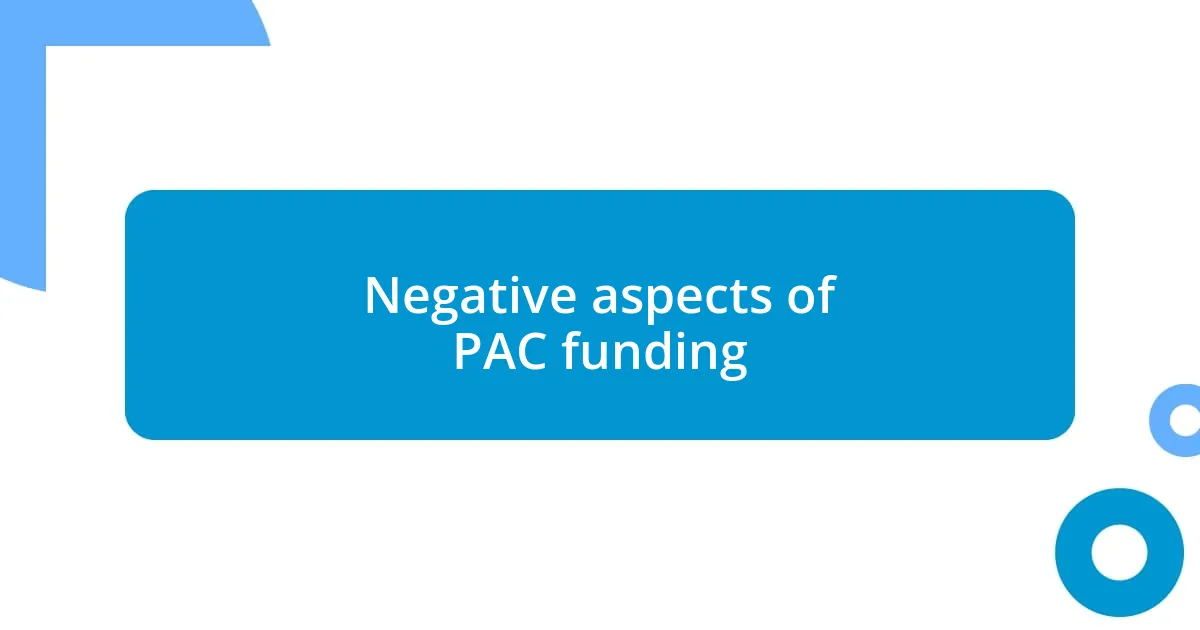
Negative aspects of PAC funding
The negative aspects of PAC funding can sometimes overshadow the benefits. For instance, I recall a discussion I had with a fellow voter who felt disillusioned after learning that a significant portion of campaign financing came from PACs with narrow interests. It made me question: who truly represents the people when so much influence comes from a select few with deep pockets? This sentiment mirrors a growing concern that donor agendas can distort the priorities of elected officials, making them less accountable to their constituents.
Another troubling aspect lies in the potential for corruption. During a local election, I witnessed a candidate’s policies shift drastically after receiving backing from a large PAC. It was unsettling to observe how quickly their message changed to align with the PAC’s goals, moving away from issues important to everyday voters. Have you ever noticed how elected officials sometimes forget their promises? It’s hard not to think that the financial influence of PACs plays a role in that betrayal of trust.
Lastly, the sheer scale of PAC financing can create a lopsided playing field. I remember attending a debate where one candidate was overwhelmed with PAC support, leaving their opponent struggling to compete on a more even basis. This inequity raises an important question: how can we, as engaged citizens, ensure that every voice matters? It’s essential we reflect on how PAC funding can lead to a political landscape that favors wealth over genuine representation, highlighting the need for reforms that promote fairness in our electoral processes.












